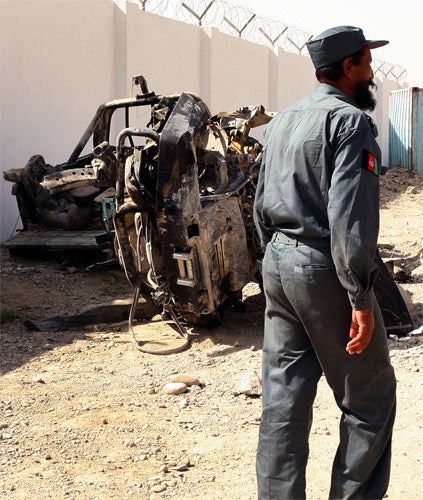'Most of them were corrupt and stoned on opium'
A senior serving soldier reveals how the Afghan policemen in Helmand are often a danger to the British forces they work with

Your support helps us to tell the story
From reproductive rights to climate change to Big Tech, The Independent is on the ground when the story is developing. Whether it's investigating the financials of Elon Musk's pro-Trump PAC or producing our latest documentary, 'The A Word', which shines a light on the American women fighting for reproductive rights, we know how important it is to parse out the facts from the messaging.
At such a critical moment in US history, we need reporters on the ground. Your donation allows us to keep sending journalists to speak to both sides of the story.
The Independent is trusted by Americans across the entire political spectrum. And unlike many other quality news outlets, we choose not to lock Americans out of our reporting and analysis with paywalls. We believe quality journalism should be available to everyone, paid for by those who can afford it.
Your support makes all the difference.When I heard the news this morning, I thought "Christ, five in one go..." I was shocked and saddened – but I was not surprised that it had happened. I'm surprised it took this long.
We went out to Helmand to mentor the Afghan National Police without understanding the level they were at. We thought we would be arresting people, helping them to police efficiently. Instead we were literally training them how to point a gun on the ranges, and telling them why you should not stop cars and demand "taxes".
Most of them were corrupt and took drugs, particularly opium. The lads would go into police stations at night and they would be stoned; sometimes they would fire indiscriminately at nothing.
They had no understanding of the basics of what it means to be a policeman. We expected to be teaching adults at a certain level and then realised we would be changing nappies. Give them 20 rounds and they will hit the target once.
The first time I saw them I realised that they had almost no training; some of them had very little ability. Their uniforms were dirty and didn't fit. Their weapon-cleaning was non-existent.
They certainly didn't have a concept of being upstanding members of the community. They had no loyalty, esprit de corps or cameraderie. That should have been incorporated in their training. They did have pride – because of the power and status they felt.
How do you train this band of idiots and turn them into a force to be reckoned with if they have no sense of loyalty, no sense of belonging?
The biggest problem was that we didn't know who we were getting. There were no security checks – they were literally allowed to come into the compound and we had to rely on the local chief of police, who recruited them. We kept a close eye on them because we didn't know or trust them – it was for our own security.
Perhaps half of them genuinely wanted to try to make the community safe: they had the right intention but the attention span of gnats. Twenty would turn up one day, none the next, then 15, then suddenly a new face would appear.
It was difficult just getting them to a basic level, to do things like man a post. They would take drugs, go to sleep, leave their post, have sex with each other. Very few were vigilant or alert.
When we went out of camp to do stop-and-searches, we became sitting ducks – nothing more than bodyguards or babysitters while they worked.
British troops felt extremely vulnerable. If they were going out on patrol they didn't tell the Afghans where, so they couldn't pass on the information – they didn't want improvised explosive devices (IEDs) laid in the area. They didn't trust them one bit.
There was an operation involving the Brits and the Afghan National Army to clear Nad-e-Ali, and it cost lives. The police were left at checkpoints, but within 48 hours all the checkpoints had been overrun or the police just buggered off. As soon as the ground was won it was lost again.
The Afghan army are a lot more switched on. They have started to stand up for themselves. But the police have not had the same investment. There is no point in pushing the army through to clear ground if you leave a void behind with the police.
Lives get lost for nothing.
The Afghan police are very good at understanding the environment and if the atmospherics have changed because they are local: they know the area and the people. They are also good at spotting IEDs, although some just pick them up and walk off with them, or put them into the back of their vehicle.
Progress is being made, but it is extremely slow. I am convinced that a lot of money has been wasted and people have lost their lives unnecessarily because it was for a political end, and not a military decision. The British Army has been pushed into doing something it should not be. This type of mentoring role could be fulfilled by our Ministry of Defence police or civilian coppers (in a secure compound).
A lot could be done without putting British soldiers' lives at risk. They should recruit the right Afghans, security check them, pay them regularly and train them properly – at least three months out of the area – all before the squaddie ever gets to see them.
The author's identity has been withheld
Join our commenting forum
Join thought-provoking conversations, follow other Independent readers and see their replies
Comments